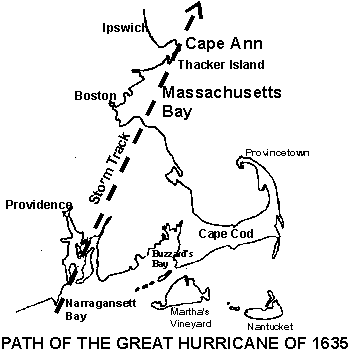 |
 |
| Home | Welcome | What's New | Site Map | Glossary | Weather Doctor Amazon Store | Book Store | Accolades | Email Us |
 | |||||||||
The Great Hurricane of 1635Often, a storm rages with such magnitude that it becomes legend. Other times there is born of a storm, a legend. But it is indeed rare for a legendary storm to spawn a story that remains as prominent in sagas as the storm itself. Such is the story of the Great Hurricane of 1635 and the legend of Thacher Island. New England weather had never been kind to the Puritan and Pilgrim fathers as they established the Massachusetts colonies. Indeed, Puritan leaders in England had urged Governor John Winthrop to relocate the colony farther south to avoid the severe winters that had claimed two hundred lives in the first winter of the Massachusetts Bay Colony alone. In the summer of the fifteenth year of Plymouth and the fifth of Massachusetts Bay, there arose a tempest of such force that the Reverend Increase Mather was to write in his Remarkable Providences that he knew of "no storm more dismal than the great hurricane which was in August of 1635." We are perhaps fortunate that the chronicles of three great writers of the time have left us details of the storm. The journals of the leaders of the two colonies, John Winthrop of Massachusetts Bay and William Bradford of Plymouth, both mention in some detail the meteorological aspects of the storm. Both also make mention of several ships caught in the fury of the storm and sea. One, the James of Bristol, held a Reverend Richard Mather and his family, which was later to include another son — the above named Increase. Another, a small bark, carried Antony Thacher and family. To his story we will return, for his trial at sea was to become legend. The strength of the tempest is readily apparent from the accounts. Winthrop wrote of such violence "that blew down many hundreds of trees...overthrow some houses and drove ships from their anchor." Bradford spoke of: "such a mighty storm of wind and rain as none living in these parts, either English or Indian ever saw.... It blew down sundry houses and uncovered others.... It blew down many hundred thousands of trees turning up the stronger by the roots and breaking the higher pine trees off in the middle." Increase Mather, writing nearly fifty years later from contemporary accounts including those of his father, indicated that the fury of the storm "threw down (either breaking them off by the bole or plucking them up by the roots) thousands of great trees in the woods." Such damage to wide areas of New England's forests would not occur again until the Great September Gale of 1815. 
Combining the accounts of Winthrop, Bradford, and Richard Mather, the track of the storm across Massachusetts as well as a summary of meteorological conditions can be established. Previous to the onset of the gale, the winds had blown from the south and southwest for several days. From present knowledge of storm track forecasting, this air flow indicates that conditions were conducive for a tropical storm to strike the New England coast with hurricane force. The storm entered the area at Narragansett Bay with its center crossing just east of Providence. The center then drove inland, passing between Plymouth and Boston, heading again out to sea near Cape Ann. The strength of the winds can only be determined by their destruction along the coast. Bradford, speaking further of the damage to the forests, remarked "the tall young oaks and walnut trees of good bigness were wound like a withe, very strange and fearful to behold The signs and marks of it will remain this hundred years in these parts w[h]ere it was sorest." Tide and storm surge rose to such heights as to cause coastal-dwelling Indians to take to the trees for safety, a fearful choice considering the violence of the winds. The tide in Narragansett Bay rose to fourteen feet above normal, drowning eight Indians as they fled from their wigwams. In Boston Harbor, the ebb tide was met by the opposing storm sea and forced back again. The greatest drama, however, occurred just off the coast as a number of ships bringing settlers and supplies to the young colonies were caught in the full force of the gale. The Gabriel was lost at Pemaquid. The Dartmouth fleet was forced to cut all its masts at St. George. The Great Hope of Ipswich, England, in an account of Winthrop was "driven aground at Mr. Hoffe's Point, and brought back again presently by a NW wind and ran on shore at Charlestown." The James out of Bristol met the hurricane off the Isles of Shoals, there losing three anchors and being forced to put to sea, for no canvas or rope would hold. The storm winds drove her to within feet of the Pascataquack rocks. "At this moment," wrote Increase Mather (his father, mother, and four brothers being among the one hundred passengers), "their lives were given up for lost; but then, in an instant of time, God turned the wind about, which carried them from the rocks of death before their eyes." So were the parents of' a great American family delivered from death at the hands of the tempest. Of the one hundred plus aboard the James, none were lost. The same fate did not await the twenty-three souls aboard a small bark distinguished only as owned by a Mr Allerton. Among the passengers was a Mr Antony Thacher who, along with his wife, alone survived. His account of the deliverance written "with drowned pen and shaking hand to indite the story of such sad news as ever before this happened in New England," will be our guide to the legend of Thacher Island. On the 11th of August 1635, there embarked from Ipswich, Massachusetts, bound round Cape Ann for Marblehead, a Reverend Avery answering a pastoral call from the young community there. With Avery sailed his wife and nine children and his cousin and perpetual friend, Antony Thacher, accompanied by his wife and six children. The evening of the 14th brought the bark into a gale as she rounded Cape Ann. The aged canvas sails split under the blow, and the crew resolved to set the anchor until morning before restoring the rigging. But before day's light, "it pleased the Lord to send so mighty a storm as the like never known in New England." Driven before the wind and wave, Avery and Thacher solemnly recommended themselves to the Lord both of earth and seas, expecting the next wave to swallow them into the deep. It is impossible to express the fear of the moment better than in Thacher's own words: "And as my cousin, his wife, and my tender babes sat comforting and cheering one the other in the Lord against ghastly death, which every moment stared us in the face, and sat triumphing upon each other's forehead, we were by the violence of the waves and the fury of the winds (by the Lord's permission), lifted up upon a rock between two high rocks, yet all was one rock, but it raged with the stroke which came into the pinnace.... The waves came furiously and violently over and against us." "Now look with me upon my distress and consider my misery... my goods and provisions swimming in the seas, my friends almost drowned, and mine own poor children so untimely... before mine eyes drowned and ready to be swallowed up, and dashed to pieces against the rocks by the merciless waves, and myself ready to accompany them." The surf beat its relentless tattoo upon the vessel. The foremast was down, the main thrice broken, the fore part of the pinnace beaten away, goods tossed about in the sea, all accented by the wail of children beseeching their Savior's intercession. A sailor was washed overboard and back again upon the same wave, crying for mercy the while. As the two families huddled together in that torn cabin, comforting one another in the face of the cruel sea, a mighty wave washed Thacher out upon the rocks. Arising, he saw that his daughter, Rev. Avery, and Avery's eldest son had also been swept to a small hole in the top of the rock. Thacher's wife was attempting to come to him when another great wave dashed the pinnace to splinters, washing her away in the scuttle. Those remaining in the bark were likewise swept into the sea. The same wave also swept the four from the rocks and into the raging waters; "the Lord, in one instant of time, disposing of fifteen souls of us, according to His good pleasure and will." Fortune, however, smiled upon Thacher, for as he was swept off the rock, he slid into the sea with his head above water. There he espied a plank from the bark, and, reaching out, took hold seconds before the sea dashed him against the rocks. Battered about in the turbulent waters, Thacher soon found his right foot had touched ground. Struggling, he crept to the shore and safety. Turning, he searched the shore for signs of his family and friends. There before him lay his wife untangling herself from the wreckage. "When we were come to each other, we went and sat under the bank. But fear of the seas roaring, and our coldness would not suffer us there to remain. But we went up into the land and sat us down under a cedar tree which the wind had thrown down, where we sat about an hour almost dead with cold." Soon the wind died, though the seas remained rough and fearful to the Thachers. Hope for their children stirred him to lift his bruised body and search the shore for their presence. But none could be found, yet living or dead. In his mind, the last memories of his children arose causing him to consider his plight, the loss of his dear friends and family, and of all goods and provisions, he and his wife cast upon an unknown land, in a wilderness he knew no escape from. Their clothes tattered and torn to the barest threads, the Thachers combed the beach for any scrap of goods by which to sustain their lives. Thacher found a knapsack containing a steel, flint, and horn of powder, then a drowned goat and the hat and coat of his son William. Mrs Thacher found a petticoat. Also found were two wheels of cheese, some butter, and a small brass pot. With the powder, which was miraculously dry, Thacher struck a fire by which they warmed themselves and boiled part of the goat. By Monday, three days after their ordeal had begun, a boat in search of another lost vessel removed them from that desolate island to which Thacher gave the name Thacher's Woe. The rock he called Avery's Fall. Buried upon the island, he had left Avery's eldest daughter, the only body found of the twenty-one lost. Winthrop provided us with a postscript to this tale of remarkable providence. "The court gave Mr Thacher £26.13.4 toward his losses, and divers good people gave him besides." So was a legend born, another place-name given to a new land in memorial to man's struggle with storm and sea. Learn More About Hurricanes From These Relevant Books
|
|||||||||
 |
To Purchase Notecard, |
Now Available! Order Today! | |
 |
 |
NEW! Now Available in the US! |
The BC Weather Book: |


